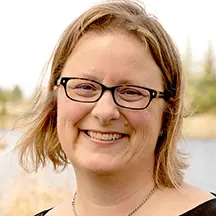
While the month of December concludes the 2020 calendar year, it marks new beginnings for the Center for Advanced Bioenergy and Bioproducts Innovation (CABBI), which is poised to begin its fourth year of Department of Energy-funded research.
This fall, the Center wished Evan H. DeLucia a warm farewell as Director and welcomed his successor, former Feedstock Production Theme Leader Andrew Leakey. Iowa State University’s Emily Heaton has since assumed the role of Feedstock Production Theme Leader. As CABBI prepares for Year 4 and many more growth opportunities, the Sustainability Theme will also add an expert to its ranks: Jennifer Pett-Ridge of Lawrence Livermore National Laboratory.
An ecologist by training, Pett-Ridge began her scientific career at Yale University, where a bachelor’s in biology refined her affinity for the outdoors into an interest in the mechanisms that drive the natural world’s patterns and processes. She remained in New Haven to earn her master’s in forest science, focusing on soil biogeochemistry: a blend of biology, geo-processes, and soil chemistry. Pett-Ridge practiced these skills during her two-year, post-master’s position as a Forest Service technician at the Hubbard Brook Experimental Forest, and it remains her primary field of interest. After her time with the forest service, she switched coastlines to pursue a Ph.D. in soil microbial ecology from the University of California at Berkeley.
Pett-Ridge now studies soil microbes full-time at Lawrence Livermore National Laboratory. As a senior staff scientist and group leader of the Environmental Isotope Systems Group, she analyzes soil composition — often measuring carbon (C) and nitrogen (N) isotopes — to assess biotic interactions and the effects of microbial activity on soil health.
Studying nutrient and C cycling is critical in the context of bioenergy agriculture, CABBI’s primary research mission. While crops like sorghum and miscanthus can produce renewable energy bioproducts to wean the global economy off fossil fuels, it’s important that growth of the cellulosic bioenergy industry is accompanied by ecosystem benefits: efficient use of water, nitrogen and phosphorous, restored soil health, and net negative C emissions.
“Carbon removal from the atmosphere is the critical issue of our time, and bioenergy crops are vital to the nation’s energy portfolio. But we must always make sure that the benefits outweigh the losses, and to do that, we need to weigh soil health in the context of aboveground productivity rates,” Pett-Ridge said.
With an arsenal of experience well-aligned to CABBI’s mission, it’s no coincidence that she originally served as the chair of the Center’s Strategic Advisory Board.
“We are thrilled to welcome Dr. Pett-Ridge to the CABBI team in this new capacity. She brings deep insight about soil microbial ecology and an advanced analytical toolkit that will benefit the Sustainability Theme and the Center as a whole,” said Sustainability Deputy Theme Leader Wendy Yang.
As a Sustainability Theme PI, Pett-Ridge will use new methods to determine how bioenergy crops affect soil microbial communities. Her team will analyze soil samples for their carbon age (using radiocarbon, 14C) and microbial activity from multiple depths and field types, providing critical insights into what’s going on below the surface. As she puts it, these quantitative measurements of the microbiome will move beyond “stamp-collecting,” and will instead be used to scale up and model bioenergy crops’ long-term effect on soil carbon stocks and nutrient cycles.
“We hope to create a win-win scenario where we use bioenergy crops for fuel, but also to remove carbon dioxide from the atmosphere — all with more sustainable land management practices,” she said. “One thing that’s so impressive about CABBI is its expansive view of agricultural issues across the country — I am so excited to begin collaborating with this team that thinks on a national scale, and that projects decades into the future.”
Pett-Ridge’s holistic mindset is one of the many strengths she brings to CABBI’s Sustainability Theme, which operates with the understanding that “sustainability” isn’t just about the environment, the economy, or the social sector — it’s about balancing all three.
“If we start implementing changes in crop management that do not fit in with the financial, environmental, and social needs of the places where those crops are being grown, it’ll be hugely disruptive to the global food market. That’s what sustainability is to me: thinking through as many of those externalities as you possibly can,” Pett-Ridge said.
CABBI is pleased and excited to welcome her and Lawrence Livermore National Laboratory to our cohort of esteemed federal partners.
— Article by CABBI Senior Communications Specialist Jenna Kurtzweil
Read more about Pett-Ridge on the Lawrence Livermore National Laboratory website >>>